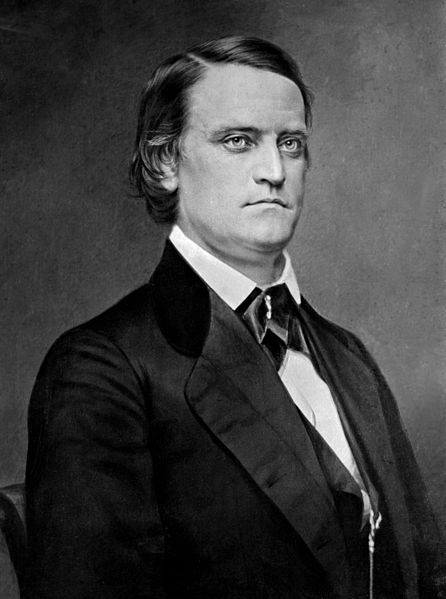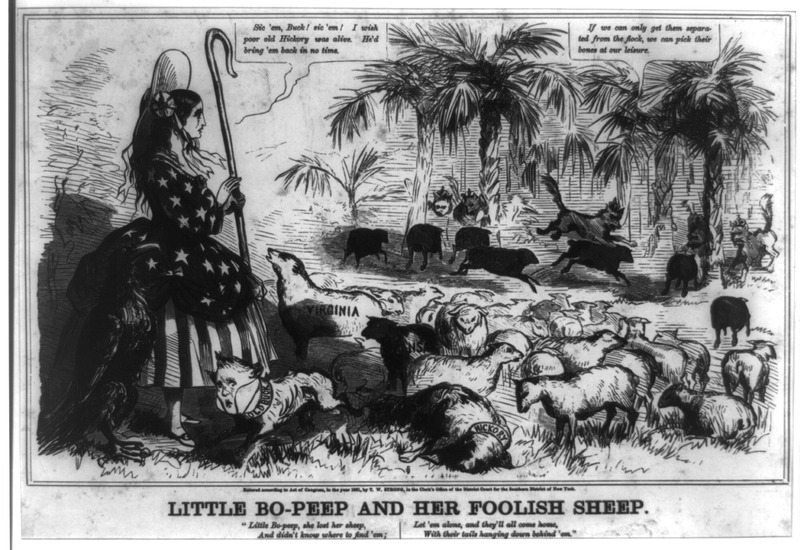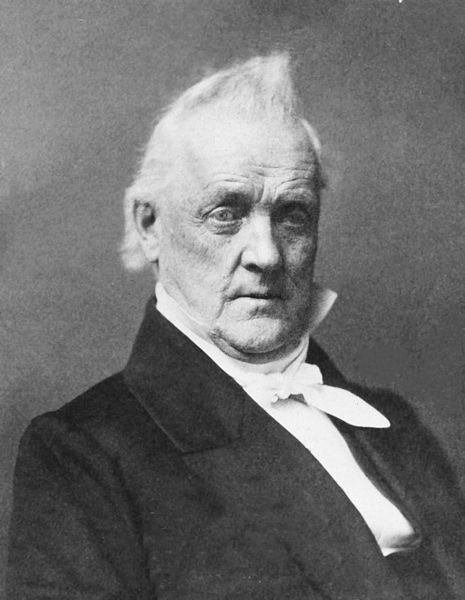| James Buchanan | |
|---|---|
 |
|
| 15th United States President « Previous Next » |
|
| In office | Mar. 4, 1857 – Mar. 4, 1861 |
| V. President | John Breckinridge |
| Political Party | Democratic Party |
| Personal Info | |
| Born | Apr. 23, 1791 |
| Died | June 1, 1868 (at age 77) |
| Religion | Presbyterianism |
| School | Dickinson College |
| Profession | Lawyer |
| Signature | |
| U.S. Presidents 1-15 | |
| 1. George Washington (1789–1797) | |
| 2. John Adams (1797-1801) | |
| 3. Thomas Jefferson (1801-1809) | |
| 4. James Madison (1809-1817) | |
| 5. James Monroe (1817-1825) | |
| 6. John Quincy Adams (1825-1829) | |
| 7. Andrew Jackson (1829-1837) | |
| 8. Martin Van Buren (1837-1841) | |
| 9. William Henry Harrison (1841-1841) | |
| 10. John Tyler (1841-1845) | |
| 11. James Knox Polk (1845-1849) | |
| 12. Zachary Taylor (1849-1850) | |
| 13. Millard Fillmore (1850-1853) | |
| 14. Franklin Pierce (1853-1857) | |
| 15. James Buchanan (1857-1861) | |
| List of All the Presidents |
It was during the increasing anger and resurfacing of the previously settled issues by the Compromise of 1850 that James Buchanan Jr. was elected as the 15th president of the United States of America. He is currently the only president who never married and came from the state of Pennsylvania; and the last American president whose date of birth was from the 18th century.
Childhood and Education
James Buchanan came from a Scottish and Irish lineage and a family of merchants settling in the state of Pennsylvania. He was born on the 23rd of April, 1791 with parents James Buchanan Sr., an emigrant from the town of Donegal in Ireland and Miss Elizabeth Speer.
The second of the eleven Buchanan children, James, was destined by his parents to have better opportunities than other people. After moving to Mercesburg, a town located at the southern portion of Pennsylvania, he was sent to a local school to learn basic skills. The achievements of his father in terms of managing businesses and the growing interest of Madame Speer to higher education pushed James to study at Dickinson College even if it was located miles away from their home.
As a young boy, James Buchanan, showed promise to be a brilliant student but his inappropriate behavior and poor self discipline almost got him expelled from Dickinson College twice. He pleaded and was given another chance to make amends resulting in his graduating with honors in September, 1809.
He decided to embark on a law career and moved to Lancaster a year after college graduation. James Buchanan received his attorney’s license in 1812 and the Pennsylvania bar accepted him as a member the following year.
He was planning on practicing his law career but the War of 1812 broke out. Men from different walks of life were recruited to put up a fight, but James Buchanan tried to avoid getting involved with it because he found the issue not really worth fighting for. It was the invasion of the British forces in Maryland that made him volunteer and defend Baltimore.
Early Career in Politics
 After the war, James Buchanan went back to Lancaster where he used his legal skill and knowledge to become famous and build wealth. Aside from his career, he was also elected as a representative of Pennsylvania where he was invited to become a Federalist. His career as a politician was seen in 1821 when he was chosen as chairperson of the Committee on Judiciary, a position he held until 1831.
After the war, James Buchanan went back to Lancaster where he used his legal skill and knowledge to become famous and build wealth. Aside from his career, he was also elected as a representative of Pennsylvania where he was invited to become a Federalist. His career as a politician was seen in 1821 when he was chosen as chairperson of the Committee on Judiciary, a position he held until 1831.
Following the dissolution of the Federalist Party in 1815, James Buchanan moved to the Democratic Party and was later elected as a member of the senate to fill in a vacant position. He worked as a senator in 1834 and with an impressive performance record, was elected for the same position in 1837 and again in 1843.
In 1845, James Buchanan resigned from the senate and accepted a nomination for him to become a Secretary of State where he mainly functioned on foreign and international relations after a recommendation and nomination by the then president James K. Polk. He worked with the president for an additional four years, and as known as a valued cabinet member when he facilitated the Oregon Treaty in 1846 thus making the 49th parallel an important boundary of the country.
Last Chance to Run
Since James Buchanan rose to a senatorial seat, he already had his sights on the White House, thus trying his best in every way to become a favorable candidate. He actually tried and was nominated to become a presidential candidate by his political party in the elections of 1844, 1848, 1852 but he was never given the enough votes to make him the Democrat candidate until the election of 1856.
 Throughout his political life, the issue of slavery has changed from an underground concern to a pressing issue to the growth of America. James Buchanan was not really campaigning for the ownership of slaves, but he preferred its institution than accepting the interests of the abolitionist movement. He saw the Northern campaign as a group that would meddle with different political issues and cause trouble to get things their way.
Throughout his political life, the issue of slavery has changed from an underground concern to a pressing issue to the growth of America. James Buchanan was not really campaigning for the ownership of slaves, but he preferred its institution than accepting the interests of the abolitionist movement. He saw the Northern campaign as a group that would meddle with different political issues and cause trouble to get things their way.
This thinking together with the fact that Buchanan was still in England when the Kansas-Nebraska Act caused turmoil and bloodshed between pro-slavery and Abolitionist factions made him an eligible candidate to represent the interests of the Democratic Party. “Old Buck” as he was popularly called was chosen as a presidential candidate in 1856.
James Buchanan’s campaign for presidency was not easy. He competed against the representative of the Republican Party, John C. Frémont and former president Millard Fillmore, who was the candidate of the Know Nothings party. Dirty political strategies were widely used at that time, ranging from wearing badges that tarnished the reputation of the rival candidates to exaggerated interpretations of senseless things such as Buchanan’s body expression of tilting the head which the Republicans claim to be the result of a previous attempt to commit suicide.
At the counting of the electoral votes, James Buchanan Jr. won the presidency narrowly. He was able to acquire the votes of the Southern states because of his obvious inclination with the interests of the pro slavery movement and only had four votes from the north.
The Presidency of James Buchanan
 During his inauguration speech in 1857, he specifically mentioned that the issue of slavery must be left to be decided by the people of the territory as long as they comply with the by laws and guidelines set by the American Constitution. This caused early criticism by the abolitionists claiming that these people who can express their views are only limited to white people because African Americans at that time did not have the right of suffrage, even if they were free.
During his inauguration speech in 1857, he specifically mentioned that the issue of slavery must be left to be decided by the people of the territory as long as they comply with the by laws and guidelines set by the American Constitution. This caused early criticism by the abolitionists claiming that these people who can express their views are only limited to white people because African Americans at that time did not have the right of suffrage, even if they were free.
Moreover, the Dred Scott case whose result was given a couple of days after the inauguration caused further uproar among the abolitionists and the Northerners. The court mentioned that slaves are not citizens of the country and are nothing more than property thus he or she is not protected by the same rights that is observed in treating white people.
This has caused a greater division between the Northern and Southern states. The northern abolitionists regarded Buchanan as an instrument of slave owners in a conspiracy to take control of the government to continue allowing slavery which brought them lucrative business. The slave owning people from the South felt that they were being heard and understood by the law.
His term of office as president of the United States was riddled by the issue of slavery. He was ridiculed by a lot of people for not being able to settle and resolve the issue caused by President Pierce in Kansas, and for the increasing murders between the people in this state. A perfect example would be the militant anti-slavery leader who killed some slave owners, he was regarded as a hero by the Northern people but Buchanan showed support for the Southerners that resulted in the execution of Brown in 1859.
James Buchanan tried his very best to expand foreign relations and to pacify the increasing tension between the different sectors of the society but he failed in all these attempts.
After the Buchanan Presidency
Near the end of his term as president, his popularity severely declined and the issue of slavery was even more pressing. He kept his word that he would not run again for office and did not play a role in the preparation for the 1860 election. The Democrats were roughly divided making the Republican Party victorious in having the White House position at their side through Abraham Lincoln.
James Buchanan ended his reign as president in March 1861 where he was regarded as one of the worst presidents in the history of the United States, like his predecessor Franklin Pierce. His talent and skill as a lawyer and politician were overpowered by his inability to make a firm stand regarding slavery. He tried to make himself appear that he does not side with anyone in the said issue but when it came to making choices – he sided with his friends from the South.